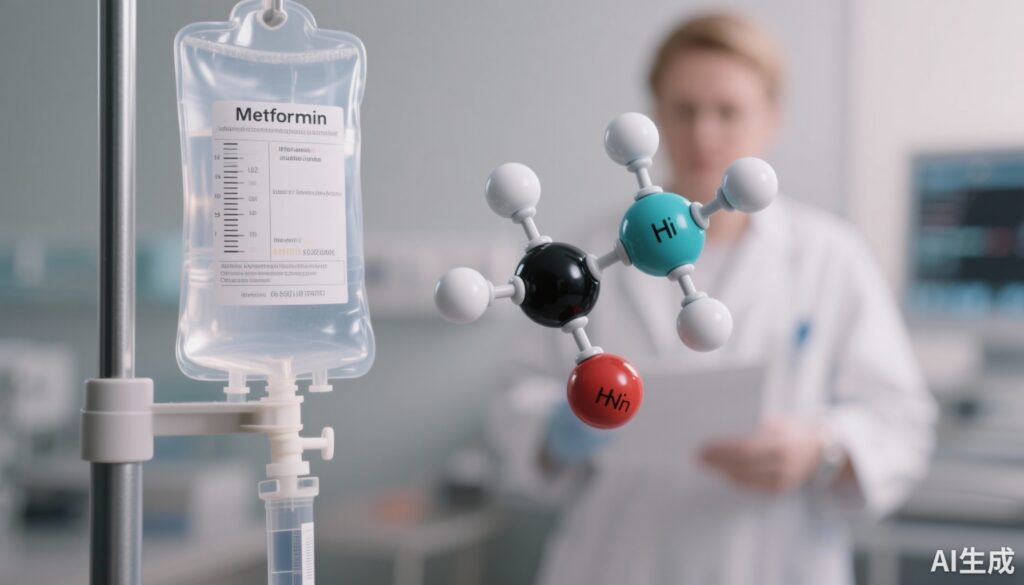Introduction
Endometrial cancer (EC) is the most common gynecologic malignancy in developed countries and represents a significant therapeutic challenge in advanced or recurrent settings. Standard first-line chemotherapy often comprises paclitaxel plus carboplatin (PC), which has demonstrated efficacy but remains associated with suboptimal long-term survival outcomes. Metformin, a widely used anti-diabetic medication, has demonstrated antitumor effects in preclinical studies through mechanisms including inhibition of the mTOR pathway and reduction of insulin/IGF signaling, which are implicated in endometrial carcinogenesis. The hypothesis that metformin could improve outcomes in EC has led to clinical investigation of its addition to chemotherapy regimens. This article critically appraises the randomized phase II/III study conducted by the NRG Oncology/GOG that evaluated the efficacy and safety of adding metformin to standard PC chemotherapy in patients with measurable stage III or IVA, stage IVB, or recurrent EC.
Study Background and Disease Burden
Endometrial cancer incidence is rising, in part due to obesity and metabolic syndrome prevalence, underlining the potential linkage between metabolic dysregulation and EC progression. Advanced stage or recurrent disease carries a poor prognosis, with five-year survival rates remaining limited despite conventional chemotherapy. The unmet need for improved systemic therapies has catalyzed exploration of adjunctive agents that might potentiate chemotherapy effects or target EC biology more effectively. Metformin’s established safety profile and plausible anti-cancer mechanisms make it an attractive candidate for repurposing in this context.
Study Design
This was a randomized, double-blind, placebo-controlled phase II/III trial enrolling chemotherapy-naïve patients with stage III/IVA EC with measurable disease, stage IVB, or recurrent disease regardless of measurable status. Participants were randomly assigned to two arms: paclitaxel/carboplatin chemotherapy combined with oral metformin at 850 mg twice daily, or paclitaxel/carboplatin with a placebo, continued as maintenance after chemotherapy until disease progression.
The primary endpoint for phase II was progression-free survival (PFS), aiming to identify early signals of efficacy. Based on phase II results, metformin was deemed worthy of further testing in phase III, where overall survival (OS) was the primary endpoint. Secondary outcomes included objective response rate (ORR), duration of response, and toxicity profiles.
Key Findings
Between March 17, 2014, and December 22, 2017, a total of 448 patients were recruited and randomized. Interim analysis for phase II supported the continuation to phase III. However, the interim phase III analysis conducted on February 1, 2018, demonstrated futility, leading to early termination of the trial for lack of survival benefit.
Interestingly, the hazard ratio (HR) for death in the metformin arm compared to placebo was 1.088 with a 90% confidence interval (CI) ranging from 0.803 to 1.475, indicating a trend toward a higher risk rather than benefit. For progression-free survival, the HR was 0.814 (90% CI: 0.635-1.043), which suggested a nonsignificant trend favoring metformin, but insufficient magnitude to continue the trial.
Median OS was not reached in the placebo arm at the time of analysis but was 28 months in the metformin arm, albeit with limited follow-up (10 months median) and 121 deaths total. Secondary endpoints, including ORR and duration of response, did not demonstrate meaningful differences. Toxicity was comparable between groups, with no unexpected adverse events linked to metformin administration.
Expert Commentary
This large, well-designed trial provides high-level evidence that metformin, despite attractive preclinical rationale, does not improve survival outcomes when added to first-line chemotherapy in advanced or recurrent EC. The discrepancy between preclinical data and clinical outcomes could relate to multiple factors including dosing, tumor heterogeneity, metabolic context, and cancer microenvironment complexity.
The slightly increased hazard of death observed may be a chance finding or related to unrecognized effects of metformin in this clinical context, underscoring the importance of rigorous randomized testing even for repurposed agents. The continuation of metformin as maintenance therapy without demonstrated PFS or OS benefit also highlights challenges in translating in vitro and epidemiologic findings into therapeutic advances.
Additionally, the trial enrollment criteria encompassed a broad spectrum of advanced EC subgroups, which might dilute potential benefits limited to molecularly defined subsets. Future research may benefit from biomarker stratification to identify patient populations more likely to respond to metabolic interventions.
Conclusion
The NRG Oncology/GOG phase II/III trial conclusively shows that adding metformin at 850 mg twice daily to paclitaxel/carboplatin chemotherapy for measurable stage III/IVA, IVB, or recurrent EC does not improve progression-free or overall survival. These findings do not support routine use of metformin as adjunct therapy in this setting. This trial highlights the critical need for continued evaluation of novel agents and biomarkers to better tailor systemic therapies in advanced endometrial cancer.
References
Bae-Jump VL, Sill MW, Gehrig PA, Merker JD, Corcoran DL, Pfefferle AD, et al. A randomized phase II/III study of paclitaxel/carboplatin/metformin versus paclitaxel/carboplatin/placebo as initial therapy for measurable stage III or IVA, stage IVB, or recurrent endometrial cancer: An NRG oncology/GOG study. Gynecol Oncol. 2025 Apr;195:66-74. doi: 10.1016/j.ygyno.2025.03.003. Epub 2025 Mar 8. PMID: 40056832; PMCID: PMC12368636.
Liu H, Guo W, Wu K, et al. Metformin and endometrial cancer: molecular impact and clinical implications. Gynecologic Oncology Reports. 2023;45:101155.
Salvesen HB, Köbel M, Stratford EW, et al. Integrated molecular characterization of endometrial carcinoma. Nature. 2018 Aug;560(7717):67-73.
Nagle CM, Jernigan A, Webb PM, et al. Obesity and Endometrial Cancer: Molecular and Epidemiologic Research Perspectives. Int J Cancer. 2023;152(5):896-905.


